#GDP
Explore tagged Tumblr posts
Text

(Source)

#destiel#us politics#politics#economy#gdp#gross domestic product#us economy#tariffs#trump#donald trump#trump economy#this doesn't even include all the tariff waffling in April#castiel#dean winchester#breaking news
182 notes
·
View notes
Text
US economy contracts at 0.3% rate in Q1, first GDP pullback in 3 years
The US economy contracted for the first time in three years to start 2025 as a surge in imports dragged down GDP and prices increased more than forecast.
The Bureau of Economic Analysis' advance estimate of first quarter US gross domestic product (GDP) showed economic growth contracted at an annualized rate of 0.3% during the year's first three months, more than the 0.2% decline expected by economists surveyed by Bloomberg. The reading came in significantly lower than the 2.4% rate of growth seen in the fourth quarter of 2024.
White House Swears New Economic Data Shows Down Is Up, Actually
The White House is trying to spin news the GDP shrank last quarter as a sign of strong economic momentum and claiming that “core GDP,” whatever that means, is actually “robust.”
“Robust core GDP, the highest gross domestic investment in four years, job growth, and trillions of dollars in new investments secured by President Trump are fueling an economic boom and setting the stage for unprecedented growth as President Trump ushers in the new Golden Age,” said Press Secretary Karoline Leavitt in a memo titled, “New Data Reveals Strong Economic Momentum.”
Leavitt blamed former President Joe Biden for Trump’s lackluster performance, though it’s unclear why. The economy hasn’t seen negative growth since the first quarter of 2022, when the global economy was struggling to shake off the COVID epidemic.
In the same statement, the White House also claimed that “core GDP” actually grew at 3%, without defining the term, and claimed that “colder-than-usual weather and California wildfires” — not Trump’s tariffs — are to blame.
55 notes
·
View notes
Text
The degrowthers are right: There needs to be a lot less physical stuff produced, especially in the way of fossil fuels, and, for anyone with the least sense of justice, this means rich countries consuming less and poor countries consuming more. Such an apparent threat of rich-country austerity meanwhile contains, in truth, the promise of abundance: fewer but more durable goods, less work and more leisure. (Already in the 1990s, the French-Austrian ecosocialist André Gorz wanted to “build the civilization of liberated time” in place of that of wage labor.) The fact that any such global rebalancing of consumption patterns can’t plausibly take place so long as the rich countries of the Global North dictate world history is one more reason that degrowth remains a dead letter under capitalism. It is not, however, the working classes of the Global North that must drastically curtail their lifestyles: The world’s richest 1 percent are responsible for as much carbon emissions as the poorest two-thirds of the global population. Much of the work of degrowth would be accomplished by the dispossession and destruction of the class represented by this sole percentile. As for the idolaters of growth, their god has not only failed but, Cronus-like, has started devouring its children as if these were so many chicken wings. “Growth” fantasizes one kind of fake substance, and “degrowth” another; real intelligence demands attention to how the ingredients of this world are different, not the same. Even so, the advocates of degrowth (a more attractive English word might be Samuel Beckett’s “lessness”) can boast of a sounder moral and political intuition than can the usual apologists for growth: Less stuff, more life! Such an argument may be obviated soon enough, either way, by the specter not of degrowth communism, but of prolonged capitalist contraction. Voters and politicians whistling past the graveyard being prepared for our children may have neglected to consult a recent article in Nature which holds that “the world economy is committed to an income reduction of 19% within the next 26 years independent of future emissions choices” (emphasis mine). Important factors in this bleak outlook include the declining agricultural yields and the massive and unpredictable damage to infrastructure attendant on climate collapse. In other words, even if carbon emissions are somehow reduced through the magic of the market, climate change can be expected to cause about $38 trillion in damages annually by the mid-century, enough to render overall economic growth infeasible. The choice facing the 21st century, then, is likely not between degrowth and growth. It is more likely between a form of capitalist contraction in which prosperity endures for a few but evaporates for the rest of us, and some kind of socialist or communist degrowth in which the well-being of everyone in general prevails over the wealth of anyone in particular. The precise politics of egalitarian degrowth are no more clear to me than they are to Saitō. But universal crisis will license strategies that theory alone could never discover.
26 August 2024
205 notes
·
View notes
Text
BREAKING— The United States GDP has contracted for the first time in years shrinking -0.3% in Quarter 1 of 2025. That is negative growth on the economy reflected during Trump’s 100 days since he took office as it looks like definite certainty of a recession looming as early as Summer.
For comparison, Quarter 4 of 2024 under President Biden’s final months saw GDP grow 2.4%.
This is a direct result of Trump’s chaotic tariff and economic policy as companies are in the stages of conducting layoffs, halting production as well as major ports around the country seeing significant drops in container traffic these past few weeks.
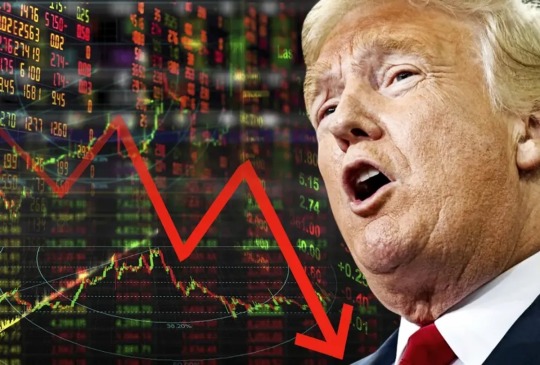
#donald trump#breaking news#us politics#politics#potus#president trump#news#united states politics#president of the united states#tumblr#united states news#us economy#us news#usa news#usa#economy#thoughts and tariffs#trump tariffs#us tariffs#tariffs#gdp#president donald trump#president joe biden#us presidents
39 notes
·
View notes
Photo
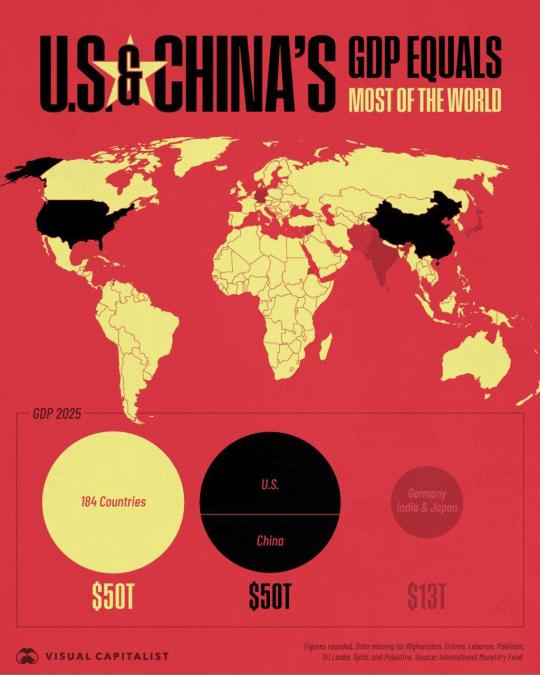
US and China GDP Equals Most of the World
121 notes
·
View notes
Text
Europe Could Be at War Without the U.S. — And Nobody’s Ready for That
Hey all, check out my piece on World War III. Would love to hear your thoughts! "In 2025, the question of whether World War III will happen feels less hypothetical and more like a matter of scheduling." Here's a free link:
Thanks <33
#donald trump#politics#usa politics#fuck maga#jd vance#satire#american politics#democracy#america#europe#russia#china#world war 3#defense and military forces#gdp#fuck donald trump#trump administration
20 notes
·
View notes
Text
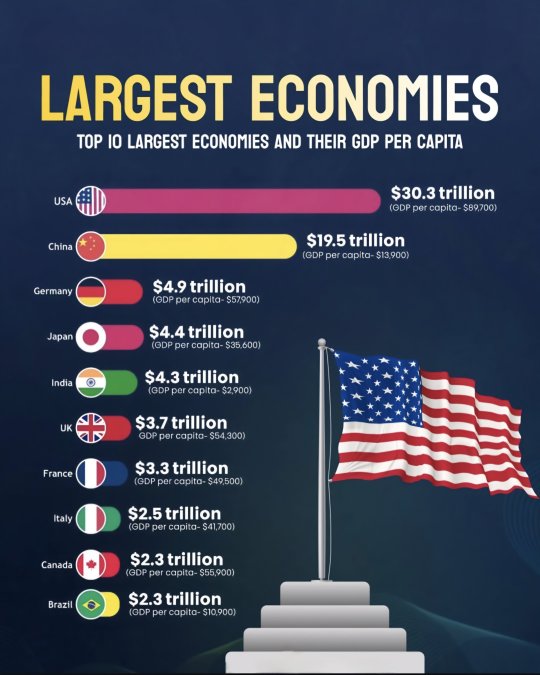
Top 10 Largest Economies along with their GDP and GDP per capita
(by Globalstats11/x)
22 notes
·
View notes
Text
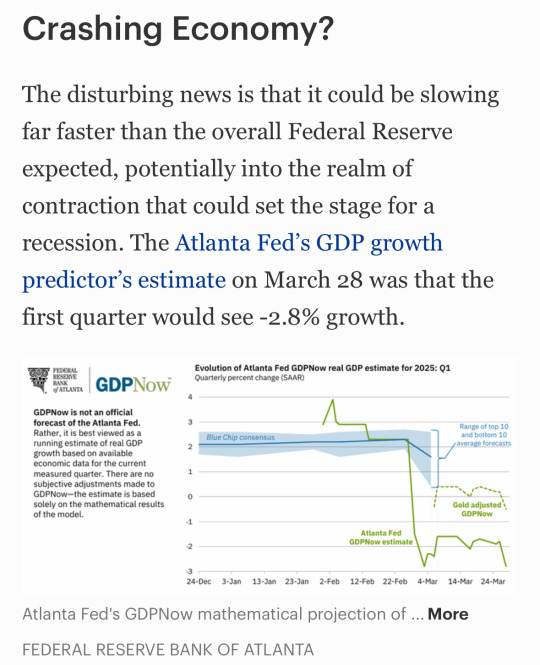
#politics#political#us politics#news#donald trump#president trump#american politics#elon musk#jd vance#law#economic#economics#economy#money#finance#gdp#atlanta fed
22 notes
·
View notes
Text
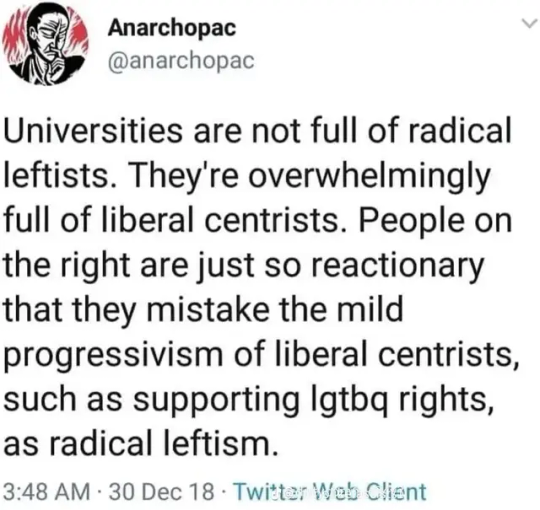

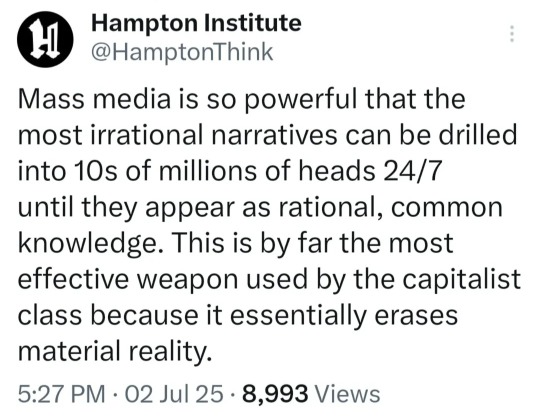







"Imperialism is the epoch of finance capital and of monopolies, which introduce everywhere the striving for domination, not for freedom." Lenin, Imperialism: the Highest Stage of Capitalism (1917)
Face it, Americans. There is no left-wing in your governance. Through and through, your country is right-wing.
(Pt.1)
#united front#meme#anticapitalism#communism#socialism#imperialism#capitalism#free palestine#memes#anti imperialism#antifascism#class struggle#free sudan#free congo#united states of america#usa#america is bad#neoliberalism#elon musk#gdp#freedom of speech#historical materialism
12 notes
·
View notes
Text
“People need to understand that ‘growth’ is not the same as social progress.” Hickel is one of the leading lights in a growing post-growth or degrowth movement. Its proponents argue that economic success cannot be measured through the crude metric of gross domestic product (GDP) and that there needs to be a managed reduction in growth in carbon-intensive countries and industries. “Growth simply means an increase in aggregate production, as measured in market prices,” says Hickel. “So, according to GDP growth, producing £1m worth of teargas is considered exactly the same as producing £1m worth of affordable housing or healthcare.” Hickel says that what matters in terms of social progress is not aggregate production but the production of specific goods and services that are necessary for improving people’s lives and achieving ecological goals – and a reduction in overall growth in high-emitting sectors and countries. “Every time a politician says they want more economic growth, we need to ask: growth of what and for whose benefit?” Opponents of the post-growth movement counter that a shrinking economy would be socially destructive, leading to a rise in unemployment, a reduction in tax revenue and therefore less money available for public services. This, they argue, would lead to increasing levels of hardship and destitution, which is already hitting marginalised communities the hardest. However, economists in the post-growth movement say a planned and purposeful reorganisation of the economy would benefit the vast majority of people. According to their vision, this could entail an organised downsizing in production of things such as mansions, SUVs, industrially produced beef, cruise ships, fast fashion and weapons – all of which are profitable to capital but ecologically destructive. At the same time, there should be a massive increase in investment in what would benefit people the most, from healthcare, public transport and renewable energy to affordable housing, nutritious food and regenerative agriculture, which offer less profit but are also less ecologically destructive. Hickel says: “In high-income countries like the UK, we have absolutely massive aggregate output. But this output is mostly organised around what is profitable to capital – and beneficial to elite consumers – rather than what is necessary for the wellbeing of everyday citizens. So despite high production we still have widespread deprivation … More than 4 million children live in poverty, and you can see the misery on our streets when you walk around. It’s madness.”
27 August 2024
173 notes
·
View notes
Text
AP, via The Guardian:
Howard Lutnick, the US commerce secretary, said on Sunday that government spending could be separated from gross domestic product reports, in response to questions about whether the spending cuts pushed by the billionaire businessman Elon Musk’s so-called “department of government efficiency” (Doge) could possibly cause an economic downturn. “You know that governments historically have messed with GDP,” Lutnick said on Fox News Channel’s Sunday Morning Futures. “They count government spending as part of GDP. So I’m going to separate those two and make it transparent.” Doing so could potentially complicate or distort a fundamental measure of the US economy’s health. Government spending is traditionally included in the GDP because changes in taxes, spending, deficits and regulations by the government can affect the path of overall growth. GDP reports already include extensive details on government spending, offering a level of transparency for economists.
Musk’s efforts to downsize federal agencies could result in the layoffs of tens of thousands of federal workers, whose lost income could potentially reduce their spending, affecting businesses and the economy at large. The commerce secretary’s remarks echoed Musk’s arguments made on Friday on X that government spending doesn’t create value for the economy. “A more accurate measure of GDP would exclude government spending,” Musk wrote on his social media platform. “Otherwise, you can scale GDP artificially high by spending money on things that don’t make people’s lives better.”
The argument as articulated so far by Trump administration officials appears to play down the economic benefits created by some forms of government spending that can shape an economy’s trajectory. “If the government buys a tank, that’s GDP,” Lutnick said on Sunday. “But paying 1,000 people to think about buying a tank is not GDP. That is wasted inefficiency, wasted money. And cutting that, while it shows in GDP, we’re going to get rid of that.”
The Trump Regime plans to manipulate the gross domestic product (GDP) by excluding government spending.
#GDP#Gross Domestic Product#Cooking The Books#Donald Trump#Trump Administration II#Howard Lutnick#Elon Musk
20 notes
·
View notes
Text
Ez a kemény, nem a faláb!


(forrás)
13 notes
·
View notes




